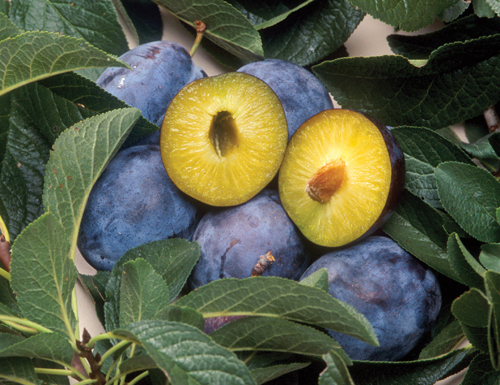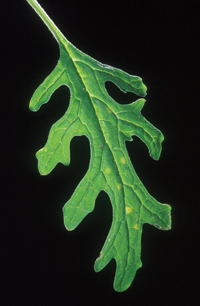
Features
Fruit
Production
GM plum may soon be okayed for commercial production in the U.S.
for commercial production in the U.S.
March 25, 2008 By Marg Land
A decision may soon be made regarding the future of the HoneySweet plum.
 |
| HoneySweet plum |
A decision may soon be made regarding the future of the HoneySweet plum.
According to a recent report in the San Francisco Chronicle, the U.S. Department of Agriculture’s Animal and Plant Health Inspection Service (APHIS) is just weeks away from announcing a decision on whether to deregulate the genetically modified plum. This decision will mark the conclusion of more than 16 years of research and development and three years of waiting.
HoneySweet, a purple-skinned and green-fleshed plum variety, was developed by researchers with the Agriculture Research Service (ARS) of the USDA, Cornell University and the Institute National de la Recherche Agronomique in France. It is manipulated with genetic material from Plum Pox Virus (PPV) in order to be resistant to the disease, and falls under the control of APHIS as a result.
Currently, HoneySweet experimental plantings are closely monitored by the U.S. agency. Pruning wood is collected and burned plus all fruit is harvested and then destroyed. Sentinel plum trees are also planted around the HoneySweet orchard to monitor for the possible spread of pollen.
 |
| Plum pox virus symptoms visible on plant foliage. |
“Initially, we had to cover all the flowering trees to prevent pollen spread,” explains Dr. Ralph Scorza, an internationally respected research horticulturalist with the ARS and one of the main researchers involved in the plum’s development. “We managed to fight this.”
Researchers hope that by deregulating HoneySweet, the variety will be free to move toward commercial production, becoming only the second transgenic fruit (the first being papaya) to be approved for public consumption in the world. It would then provide not only growers with a plum variety resistant to PPV but also stone fruit breeders with a new genetic resource to pull from.
“It could be used in breeding programs to rapidly develop PPV resistance in other varieties,” says Dr. Scorza. “More broadly, it would set the stage for the approval of genetic modification techniques for other improvements in tree fruit.”
 |
| Dr. Ralph Scorza |
This is exactly what the Organic Consumers’ Association (OCA) is fearful of. “Approval of C5 (HoneySweet) will pave the way for more GE food and tree varieties, as well as guarantee the widespread genetic contamination of conventional and organic stone fruit varieties, including plums, peaches, cherries and apricots,” states an action alert recently issued by the lobby group. Besides urging concerned citizens to request the USDA not to deregulate HoneySweet, the OCA is also advocating people send a “friendly” letter expressing their views to the U.S. plum industry through the Institute of Responsible Technology (IRT).
Tell growers “how you feel,” IRT officials state in an alert. “If you expect to change your plum eating habits if GM plums are introduced, let them know.”
Dr. Scorza admits there is reluctance within society to accept genetically modified products. “It’s ultimately up to the consumer and the industry as to whether this technology is accepted or not,” he concedes, adding genetic manipulation isn’t the only route researchers are following in the quest for answers and solutions to agricultural production problems, such as PPV.
“This is not the total answer. This is not the only thing we’re going to do. This isn’t going to save the whole world,” he says. “It won’t replace traditional breeding but it can complement it.”
Traditional fruit breeding can be a lengthy process involving years of cross-breeding, line-breeding and out-crossing. “It takes a lot (of time) to move several genes through classical breeding,” explains Dr. Scorza. Unfortunately, growers don’t always have the luxury of time when it comes to requiring a solution to a serious agriculture problem, such as PPV. According to research, PPV has the potential to affect more than 48 different species and varieties of prunus, many of which are native to North America.
“We really don’t know what would happen if PPV got into the native species,” says Dr. Scorza. Because of this, researchers ultimately decided to investigate genetic modification as one potential solution and “protect our commercial fruit so that won’t happen.”
The biotechnology-approach to controlling PPV has not been a cheap one. “To develop HoneySweet to the point it currently is has cost three times the expense of producing an advanced peach selection ready to be tested commercially,” says Dr. Scorza. “I don’t think this technology is going to be able to be used for trivial changes. It should only be used when it is the best way or only way.”
Print this page